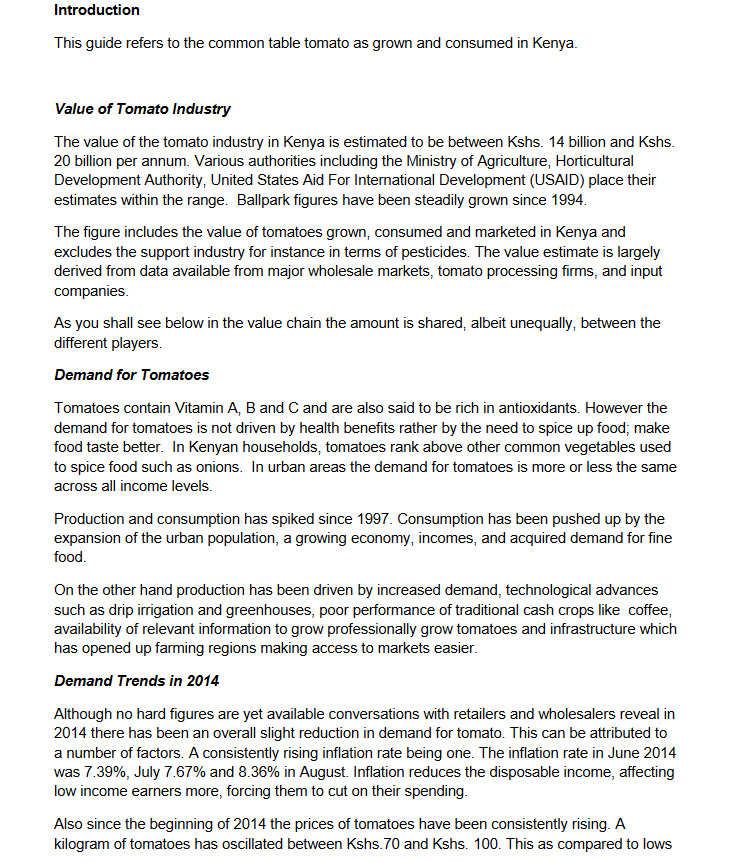Greenhouse Tomato Business Plan
Greenhouse Tomato Business Plan

Greenhouse Tomato Business Plan Overview
This Greenhouse Tomato Business Plan refers to the common table tomato as grown and consumed in Kenya.
Value of Tomato Industry
The value of the tomato industry in Kenya is estimated to be between Kshs. 14 billion and Kshs. 20 billion per annum. Various authorities including the Ministry of Agriculture, Horticultural Development Authority, United States Aid For International Development (USAID) place their estimates within the range. Ballpark figures have been steadily grown since 1994.
The figure includes the value of tomatoes grown, consumed and marketed in Kenya and excludes the support industry for instance in terms of pesticides. The value estimate is largely derived from data available from major wholesale markets, tomato processing firms, and input companies.
As you shall see in Greenhouse Tomato Business Plan the value chain the amount is shared, albeit unequally, between the different players.
Demand for Tomatoes
Tomatoes contain Vitamin A, B and C and are also said to be rich in antioxidants. However the demand for tomatoes is not driven by health benefits rather by the need to spice up food; make food taste better. In Kenyan households, tomatoes rank above other common vegetables used to spice food such as onions. In urban areas the demand for tomatoes is more or less the same across all income levels.
Production and consumption has spiked since 1997. Consumption has been pushed up by the expansion of the urban population, a growing economy, incomes, and acquired demand for fine food.
On the other hand production has been driven by increased demand, technological advances such as drip irrigation and greenhouses, poor performance of traditional cash crops like coffee, availability of relevant information to grow professionally grow tomatoes and infrastructure which has opened up farming regions making access to markets easier.
Demand Trends
Although no hard figures are yet available conversations with retailers and wholesalers reveal in 2020 there has been an overall slight reduction in demand for tomato. This can be attributed to a number of factors. A consistently rising inflation rate being one. The inflation rate in June 2020 was 7.39%, July 7.67% and 8.36% in August. Inflation reduces the disposable income, affecting low income earners more, forcing them to cut on their spending.
Also since the beginning of 2020 the prices of tomatoes have been consistently rising. A kilogram of tomatoes has oscillated between Kshs.70 and Kshs. 100. This as compared to lows of even Kshs. 20 per kilogram in August and September 2019. In 2020 a single grade tomato has ranged between Kshs.7 and Kshs.15. However from September the prices are stabilizing and gradually falling.
The increase in prices had been caused by reduced supply in the market as a result of destruction of hundred of hacters of the crop by the Tuta Absoluta pest which attacks the tomato fruit and stalk as it begins to ripen making the plant to wither. Not even tomatoes in greenhouses are immune from Tuta Absoluta. (More on the pest within the report).
Other factors that have contributed to the rise in prices have been adverse weather in tomato growing areas. If not extreme cold conditions then it has been heavy rainfall both of which do not favor tomato farming. Numerous taxes by the county authorities have also been used as an excuse to increase prices to more than proportionate levels.
The pest originated from South America but is thought to have come into the country from Ethiopia before spreading to some of the major tomato farming areas such as Isiolo, Meru, Kirinyaga and Nakuru.
Tomato Substitutes
In the Kenyan market there are no proper substitutes to tomatoes. The closest are tomato pastes and spice mixes such as Royco. Tomato pastes are gradually being adapted by parts of the middle class but not to the level that has led to a notable decrease in the demand for tomatoes. There are consumers who say tomato pastes do not taste as authentic as fresh tomatoes.
Some of the leading pastes in the market are produced in China on contract by local firms, meaning that they are not using local raw materials. Imported tomato sauces too have made their way in the Kenyan market.
Download Greenhouse Tomato Business Plan / guide here